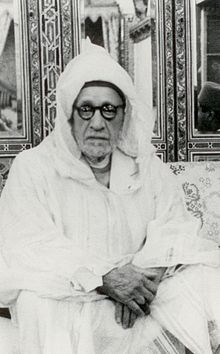- Muhammad al-Muqri
-
Muhammad al-Muqri (1844? – September 9, 1957) is more known as an adviser and grand vizier to several sultans of Morocco while that country was still under French colonial domination.[1]
Born in the city of Fes, he began his career in government during the reign of Mohammed IV of Morocco, the father of Hassan I of Morocco. During this period of time, al-Muqri went to the opening of the Suez Canal where he met with Emperor Napoleon III and Empress Eugénie. After the death of Hassan I, sultan, Abd al-Aziz seized the throne. At that time, Al Muqri was the country's representative to the 1906 Algeciras Conference at which Germany's demand for a say in Moroccan affairs was rejected in favor of France and Spain. In recognition of his efforts to resolve the Moroccan Crisis leading up to the international conference, Abd al-Aziz appointed al-Muqri as his Minister of Finance and in 1908, his Grand Vizier, a post he would hold on and off under each of the succeeding sultans until 1955. In 1909, the new sultan Abd Al-Hafid restored him to the post of Minister of Finance but promoted him to Grand Vizier in 1911. Al-Muqri resigned the post two years later, but was reappointed to it by Sultan Yusef, and was kept in the position by his successor, Sultan Muhammad, when he ascended the throne in 1927.
In 1953, when Muhammad was deposed by the French for nationalist agitation and replaced by his uncle, Sidi Muhammad bin Moulay Arafa, the colonial authorities decided to keep al-Muqri in his position. Once independence was promised, Sidi Muhammad abdicated, and al-Muqri was chosen to head the Regency by the colonial authorities until the exiled Sultan Muhammad could return to the country and assume the throne as King Muhammad V.
Al-Muqri (sometimes spelled El Mokri) left politics in 1955, shortly before Morocco gained its independence. He died two years later, at the reputed age of 112, according to the Guinness Book of World Records, or even of 116, according to other sources. Both figures are doubtful. There are no birth records or other evidence for these claims. It is rare to attain such an age and unheard of to be head of government at 110 or 114. John Gunther's book Inside Africa (published 1955) says he was born in 1851: other sources list his birth year as 1854.
On the other hand, under Moroccan standards, a grand vizier can lead a government by simply serving as an advisor from his own residency, even if the body is wearing out.
Notes
- ^ Jamil M. Abun-Nasr, A History of the Maghrib in the Islamic Period ed. Cambridge University Press, 1987 ISBN 9780521337670, p.373
Categories:- History of Morocco
- Longevity claims
- People from Fes
- Moroccan centenarians
- 1957 deaths
- Government ministers of Morocco
- Moroccan politicians
- Year of birth uncertain
- 19th-century Moroccan people
Wikimedia Foundation. 2010.

